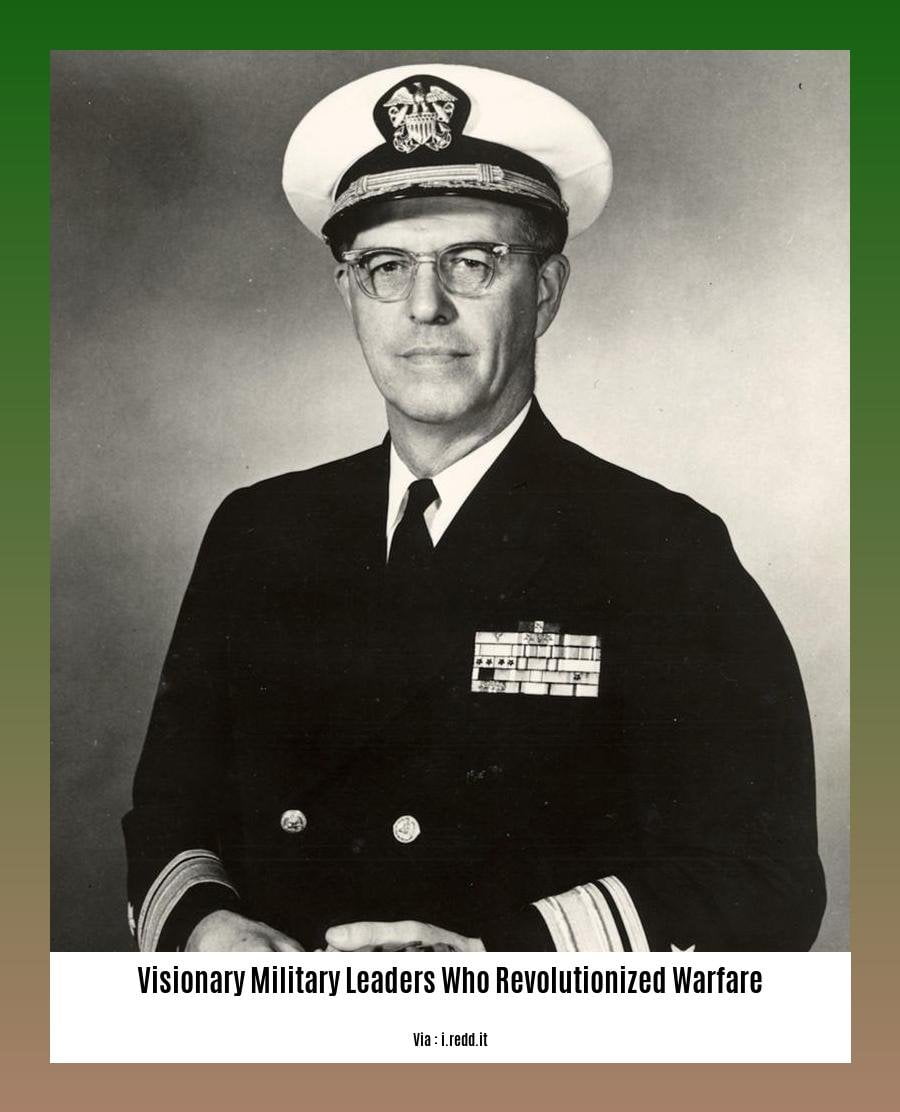In the annals of military history, visionary leaders have emerged as transformative figures, forever altering the landscape of warfare. From Alexander the Great’s revolutionary tactics to Napoleon Bonaparte’s innovative formations, these leaders have left an indelible mark on the art of strategy and combat. In this article, “Visionary Military Leaders Who Revolutionized Warfare: Historical Perspectives and Insights,” we delve into the lives and strategies of these extraordinary individuals, exploring their profound impact on the course of human conflict.
Key Takeaways:

- Epaminondas revolutionized battlefield tactics with his oblique order of battle.
- Hannibal Barca’s military strategies, including using elephants, significantly impacted warfare.
- Julius Caesar was known for his strategic brilliance and efficient legions.
- Shaka Zulu’s military reforms and innovative tactics transformed Zulu warfare.
- Genghis Khan’s mobility and adaptability in military tactics led to vast conquests.
- Sun Tzu’s “The Art of War” is a timeless military strategy masterpiece.
- Frederick the Great’s innovative tactics and aggressive approach revolutionized warfare.
- Napoleon Bonaparte’s use of artillery, mobility, and strategic maneuvers reshaped warfare.
- Erwin Rommel’s brilliant tactics earned him the nickname “Desert Fox.”
- Bernard Montgomery’s leadership during World War II, especially at El Alamein, was pivotal.
Visionary Military Leaders Who Revolutionized Warfare
Visionary military leaders who revolutionized warfare have left an indelible mark on history, shaping the course of battles and the evolution of military strategies. Their innovative thinking, bold tactics, and unwavering determination have transformed the art of war, leaving a legacy that continues to influence military commanders today.
Epaminondas and the Oblique Order
In the 4th century BC, Epaminondas, a brilliant Theban general, introduced the oblique order of battle. This revolutionary tactic involved concentrating attacking forces on one flank of the enemy line, creating a numerical advantage that allowed the Thebans to defeat much larger armies.
Hannibal Barca’s Elephants
Hannibal Barca, the legendary Carthaginian general, is renowned for his use of elephants in battle. He crossed the Alps with a formidable force of war elephants, using their size and power to terrify and disorganize enemy armies.
Julius Caesar’s Legionary Reforms
Julius Caesar transformed Roman warfare with his reforms of the legion. He reorganized and trained legions into flexible and cohesive units, capable of executing complex maneuvers and fighting effectively in both offense and defense.
Shaka Zulu’s Zulu Warfare
Shaka Zulu, the founder of the Zulu nation, revolutionized tribal warfare in the early 19th century. He introduced the iklwa spear and the “horned” formation, which enabled Zulu warriors to outmaneuver and defeat European colonial forces.
Genghis Khan’s Mobile Hordes
Genghis Khan, the Mongol conqueror, established the largest contiguous empire in history through his masterful use of mobility and adaptability. His armies used swift horses and innovative siege tactics to conquer vast territories.
Sun Tzu’s Timeless Wisdom
Sun Tzu, a revered Chinese military strategist, penned “The Art of War” in the 6th century BC. This treatise on military strategy has influenced countless military leaders throughout history, providing timeless principles on deception, surprise, and the psychology of warfare.
Frederick the Great’s Military Genius
Frederick the Great, the Prussian king, was a master of innovative tactics and aggression. He used oblique tactics, artillery barrages, and rapid troop movements to defeat superior armies and expand Prussian territory.
Napoleon’s Lightning Campaigns
Napoleon Bonaparte, the French emperor, revolutionized warfare through his use of artillery, cavalry, and rapid maneuvers. His lightning-fast campaigns and innovative tactics overwhelmed enemy forces and changed the face of European warfare.
Erwin Rommel’s Desert Warfare
Erwin Rommel, the German general known as the “Desert Fox,” excelled in desert warfare during World War II. He used mobility, deception, and unconventional tactics to outmaneuver Allied forces in North Africa.
Bernard Montgomery’s Leadership
Bernard Montgomery, a British general, displayed exceptional leadership during World War II. He played a pivotal role in the Battle of El Alamein, using deception and careful planning to defeat the German forces and turn the tide of the war.
These visionary military leaders who revolutionized warfare exemplified brilliance, innovation, and determination. Their legacies continue to inspire military commanders today, demonstrating the transformative power of strategic thinking and bold leadership.
Embark on a historical expedition to uncover the innovative military commanders ahead of their time, who challenged conventional tactics and revolutionized warfare. Delve into the minds of pioneering military geniuses before their era, whose brilliance illuminated the path for future generations. Discover the groundbreaking commanders who upended traditions, leaving an indelible mark on military strategy and forever altering the course of history.
Sun Tzu: The Enduring Principles of Warfare
For centuries, military strategists have turned to the ancient wisdom of Sun Tzu, a Chinese general and strategist, for guidance on the art of warfare. His seminal work, “The Art of War,” is a timeless treatise that outlines a set of enduring principles that have shaped military strategy throughout history.
Key Takeaways:
- Plan meticulously and avoid reliance on luck: Sun Tzu emphasized the importance of thorough planning and preparation, arguing that victory is more likely when one has carefully considered all contingencies.
- Know your enemy and yourself: Understanding the strengths and weaknesses of both your adversary and your own forces is crucial for developing an effective strategy.
- Use deception to gain advantage: Sun Tzu advocated for employing deception to confuse and outmaneuver opponents, creating opportunities for decisive strikes.
- Attack the vulnerable: Identifying and exploiting the enemy’s weaknesses is essential for achieving victory.
- Secure every victory: Sun Tzu stressed the importance of consolidating gains and not allowing defeat to turn into disaster.
Implementing Sun Tzu’s Principles Today
Sun Tzu’s principles remain relevant in modern warfare, offering valuable insights for military leaders and strategists. By embracing these enduring principles, leaders can enhance their ability to plan, execute, and win in the complex and ever-changing landscape of military operations.
Citation:
Napoleon Bonaparte: Genius and the Art of War
The annals of military history are replete with tales of brilliant minds who have transformed the art of warfare, but few can rival the genius of Napoleon Bonaparte. Napoleon’s campaigns redefined the strategy and tactics of war, leaving an enduring legacy on the battlefield.
Napoleon’s Genius
Napoleon’s military prowess stemmed from his keen intellect and unwavering determination. He possessed a remarkable ability to grasp the complexities of warfare and devise cunning strategies. His innovative tactics, such as lightning-fast maneuvers and concentrated artillery fire, caught his enemies off guard and secured him countless victories.
Expansion of the French Empire
Under Napoleon’s leadership, France conquered vast territories, establishing an empire that stretched from Spain to Russia. His military conquests not only expanded French influence but also spread his revolutionary ideals.
Tactical Mastery
Napoleon’s handling of armies in the late 18th and early 19th centuries was exemplary. He meticulously trained his troops, instilling in them a sense of discipline and loyalty. His ability to coordinate large-scale operations, such as the crossing of the Alps into Italy, demonstrated his tactical brilliance.
Limits and Legacy
Despite his unrivaled military achievements, Napoleon faced limitations towards the end of his career. Overextension and a series of costly campaigns ultimately led to his downfall. However, his legacy as a military genius remains uncontested, with his teachings and strategies continuing to be studied by aspiring commanders.
Key Takeaways:
- Napoleon Bonaparte revolutionized warfare with his innovative tactics and strategic acumen.
- He expanded France’s empire through a series of brilliant military campaigns.
- Napoleon’s handling of armies demonstrated his exceptional tactical prowess.
- Despite his limitations, Napoleon remains a towering figure in military history.
Relevant URL Source:
Napoleon as a Military Commander: the Limitations of Genius
Erwin Rommel: The Desert Fox and Master of Maneuver
Key Takeaways:
- Erwin Rommel, known as the “Desert Fox,” led Germany’s Afrika Korps to victory in North Africa.
- He employed surprise attacks and rapid movements to confound his enemies.
- Rommel’s tactical skill in desert terrain earned him the nickname “Desert Fox.”
German Field Marshal Erwin Rommel was a brilliant military commander who excelled in desert warfare during World War II. His innovative tactics, combined with his uncanny ability to outmaneuver his opponents, earned him the reputation as the “Desert Fox.”
Rommel’s most famous campaign took place in North Africa, where he led the Afrika Korps against the British Eighth Army. Despite being outnumbered and outgunned, Rommel’s forces achieved a series of stunning victories. He used surprise attacks, swift movements, and unconventional tactics to keep the British off balance.
Rommel’s ability to adapt to the challenging desert environment also contributed to his success. He understood the importance of mobility and the need to sustain his troops in the harsh conditions. He also employed local guides and gained the support of the native population.
Rommel’s innovative ideas and aggressive leadership made him one of the most respected and feared military commanders in World War II. His legacy as the “Desert Fox” continues to inspire soldiers and military strategists around the world.
Citation:

FAQ
Q1: Which military leader is considered the father of military strategy?
A1: Sun Tzu, the revered Chinese general and author of “The Art of War,” is widely recognized as the father of military strategy. His teachings have profoundly influenced military thought for centuries.
Q2: Who was the military genius who refined warfare methods and expanded France’s empire?
A2: Napoleon Bonaparte, the renowned French emperor, was a military mastermind who refined existing warfare methods, expanded France’s conquests to create a vast empire, and demonstrated exceptional tactical prowess.
Q3: What tactical skill earned Erwin Rommel the nickname “Desert Fox”?
A3: Erwin Rommel, known as the “Desert Fox,” earned his nickname due to his exceptional tactical skill in the North African desert terrain. He employed surprise attacks, rapid movements, and a deep understanding of the environment to confound his enemies.
Q4: Which military leader transformed Zulu warfare and established the largest contiguous empire in history?
A4: Shaka Zulu, the legendary Zulu king, transformed Zulu warfare through innovative reforms and tactics, including the iklwa spear and the “horned” formation. Genghis Khan, the Mongol emperor, established the largest contiguous empire in history through his military prowess and tactics based on mobility and adaptability.
Q5: Who introduced the innovative oblique order of battle, changing the course of warfare in ancient Greece?
A5: Epaminondas, the brilliant Theban general, introduced the innovative oblique order of battle in 378 BC. This tactic revolutionized warfare by concentrating forces on one flank to overwhelm the enemy.
- China II Review: Delicious Food & Speedy Service - April 17, 2025
- Understand Virginia’s Flag: History & Debate - April 17, 2025
- Explore Long Island’s Map: Unique Regions & Insights - April 17, 2025
















